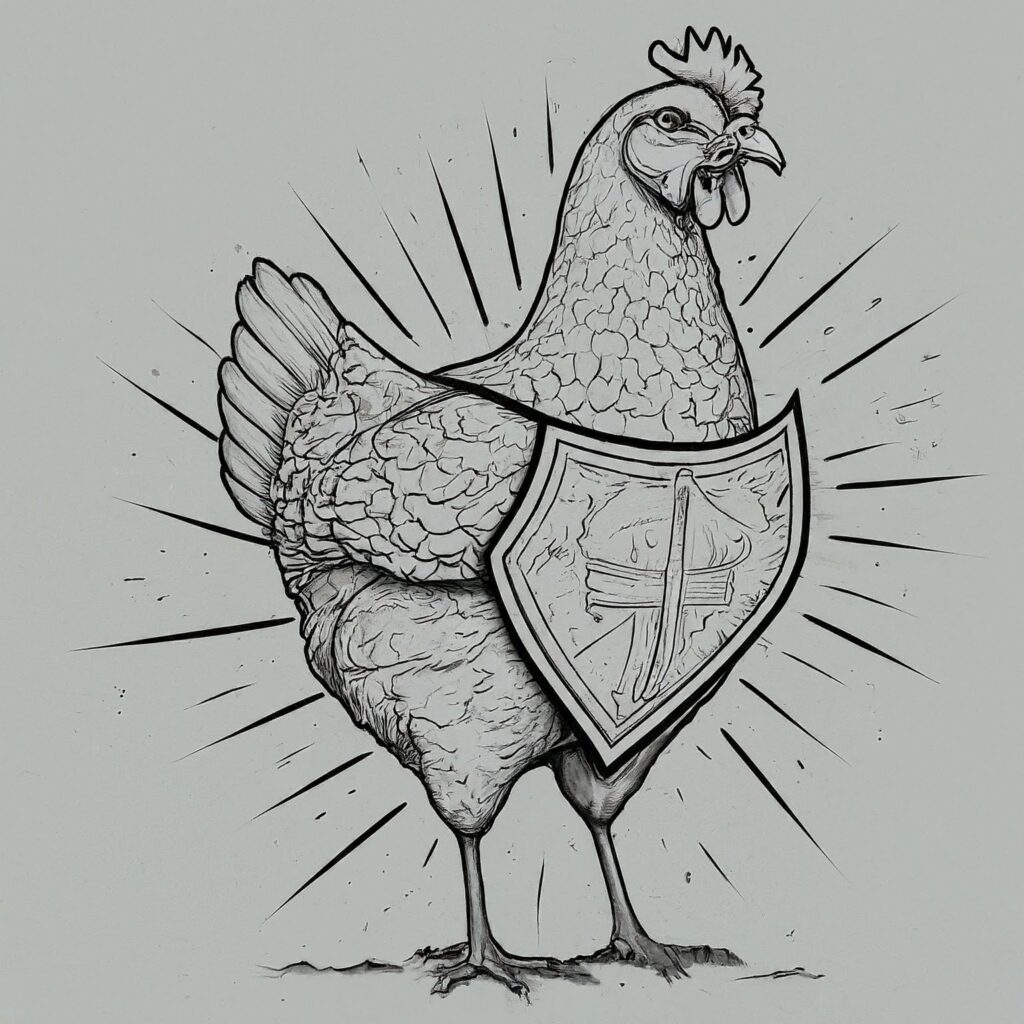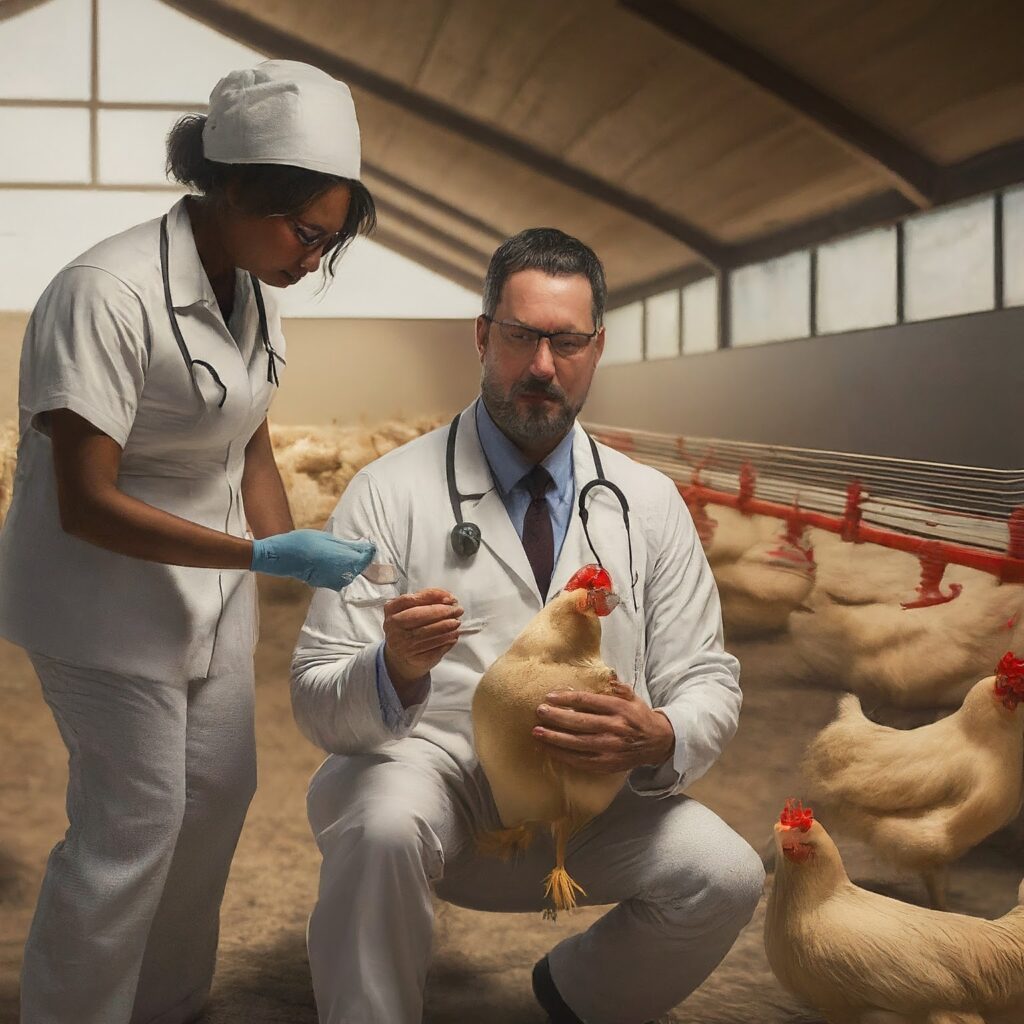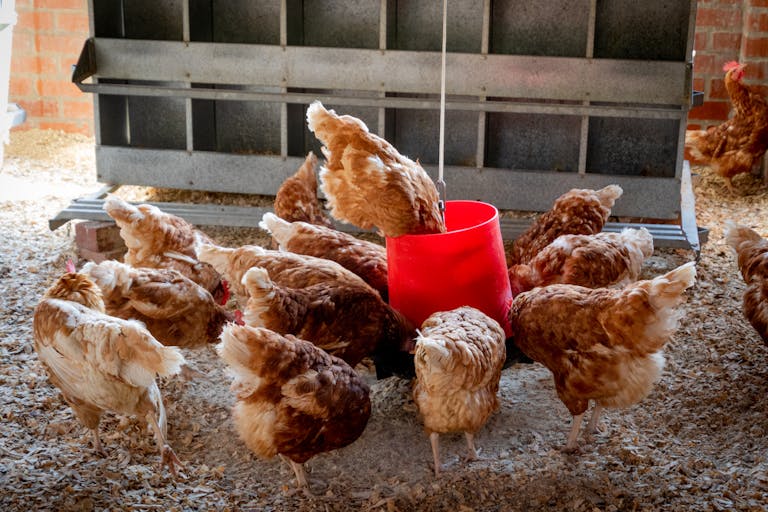Vaccination Schedule for Broiler and Layer Chickens
Maintaining the health and vitality of chickens is a top priority in poultry farming. Vaccination is a crucial tool in achieving this goal, as it provides essential protection against a range of diseases that can wreak havoc on flocks.
By implementing effective vaccination strategies, poultry farmers can not only prevent disease outbreaks but also enhance productivity and ensure the safety of the food supply chain.
In this comprehensive guide, we will explore the common ailments that afflict broiler and layer chickens and delve into the corresponding vaccines available to boost their immunity.
From establishing optimal vaccination schedules to incorporating immune-boosting practices, this guide aims to equip poultry farmers with the knowledge and tools necessary to optimize chicken health.
So, let’s embark on this journey to discover the ultimate vaccination guide and unlock the secrets to boosting chicken health.

Importance of Vaccination for Poultry
Vaccination plays a crucial role in safeguarding the health and well-being of poultry by providing essential immunity against various diseases. The effectiveness of vaccination in preventing and reducing the negative effects of diseases is evident in the long-term benefits it brings to the poultry industry.
By administering vaccines, poultry farmers can effectively manage and prevent disease outbreaks, ensuring the overall health and productivity of their flocks. Furthermore, proper vaccination practices and hygiene protocols not only improve flock health but also contribute to the safety of poultry products for human consumption.
Vaccines for common diseases such as Marek’s Disease and Infectious Bursitis have been developed to boost avian resistance to these illnesses. With the availability of vaccines in different forms, such as liquid, dry, and frozen dry, poultry farmers can easily incorporate vaccination into their management practices, particularly in the hatchery for newborn chicks.
The vaccination schedule for broiler and layer chickens should be followed diligently to achieve optimal vaccination effectiveness and long-term benefits for the poultry industry.
Common Diseases and Vaccinations
To further explore the importance of vaccination in poultry health and management, it is essential to examine the common diseases that can affect chickens and the corresponding vaccinations available to mitigate their impact. Preventing poultry diseases is crucial for maintaining a healthy flock and ensuring optimal productivity.
When choosing the right vaccines for broiler and layer chickens, there are several important factors to consider.
- Marek’s Disease (MD): This highly infectious herpes virus infection causes cancer and paralysis in poultry birds. Vaccinating against Marek’s Disease helps boost avian resistance to this illness.
- Infectious Bursitis: This viral disease severely affects young chickens, causing diarrhea and weight loss. Vaccination against Infectious Bursitis is vital to protect the health of the flock.
- Vaccination Methods: Vaccines for these diseases are available in liquid, dry, and frozen dry forms. It is recommended to administer the vaccines in the hatchery for newborn chicks.
Vaccination Schedule for Broiler Chickens
A carefully planned vaccination schedule is essential for ensuring the health and well-being of broiler chickens. Proper vaccination techniques, as well as vaccine storage and handling, play a crucial role in protecting the birds from various diseases. Here is a vaccination schedule for broiler chickens:
| Day | Vaccination | Method |
|---|---|---|
| Day 0 | Marek’s Disease (MD) | Intramuscular on the neck |
| Day 1 | I/O vaccines, vitamins, | Drinking water |
| and glucose | ||
| Infectious bronchitis | Beak dip | |
| Day 3 | Antibiotics and vitamins | Drinking water |
| Day 7 | Coccidiostat medication | Water consumption |
Following this schedule helps protect broiler chickens from diseases. Vaccination should be done in the hatchery for newborn chicks to ensure early protection. It is important to employ the correct vaccination techniques and store vaccines properly to maintain their efficacy. By adhering to a well-planned vaccination schedule, broiler chickens can be kept healthy and productive.
Vaccination Schedule for Layer Chickens
Layer chickens require a comprehensive vaccination schedule to protect them from various diseases and ensure their health and productivity.
The vaccination schedule for layer chickens includes the following:
- Infectious Bronchitis: This vaccine is crucial for preventing respiratory diseases in layer chickens. It helps in reducing the mortality rate and maintaining the quality of eggs.
- Newcastle Disease: Vaccination against Newcastle Disease is essential as it can severely impact egg production and cause high mortality rates among layer chickens.
- Fowlpox: Fowlpox is a viral disease that affects the skin and respiratory system of layer chickens. Vaccination against Fowlpox is necessary to prevent its spread and minimize the impact on egg production.
Proper vaccination ensures the effectiveness of vaccines and minimizes the risk of disease outbreaks. It also has a direct impact on egg production, as healthy chickens are more likely to produce high-quality eggs consistently.
Regular vaccination and adherence to the vaccination schedule are essential for maintaining the health and productivity of layer chickens.
Vaccination Methods and Forms
Vaccination methods and forms play a crucial role in ensuring the effectiveness and proper administration of vaccines for poultry birds. When it comes to vaccinating chickens, there are different methods and forms available, each with its own pros and cons.
Liquid vaccines are commonly used and are easy to administer through drinking water or injections. They provide good coverage and are suitable for large-scale vaccination programs.
Dry vaccines, on the other hand, are less commonly used but offer the advantage of longer shelf life and ease of storage. Frozen dry vaccines, a newer form, provide improved stability and can be stored for longer periods. However, they require special equipment for reconstitution.
It is important for poultry farmers to carefully consider the different vaccination methods and forms to ensure the best protection for their flocks.
Benefits of Proper Vaccination
Proper vaccination of poultry birds plays a crucial role in safeguarding their health and minimizing the risks of disease outbreaks. The impact of vaccination on the poultry industry is significant, as it helps prevent the spread of diseases and ensures the overall well-being of the birds.
Here are three key benefits of proper vaccination:
- Disease prevention: Vaccines create immunity in poultry birds, protecting them from various illnesses. By stimulating the immune system, vaccines help birds develop antibodies that fight diseases, reducing the negative effects and preventing outbreaks.
- Improved flock health: Vaccination, when combined with proper hygiene practices, improves the overall health of the flock. Vaccinated birds have a lower risk of contracting and spreading diseases, resulting in better productivity and reduced mortality rates.
- Safety for human consumption: Proper vaccination ensures that poultry products, such as meat and eggs, are safe for human consumption. Vaccinated birds are less likely to carry harmful pathogens, protecting consumers from potential health risks.

Best Time to Vaccinate Chickens
Timing plays a crucial role in determining the effectiveness of chicken vaccination, ensuring optimal protection against diseases. Vaccination timing refers to the specific age or stage at which chickens should receive their vaccines.
The best time to vaccinate chickens is at the hatchery for newborn chicks. This early vaccination allows for the development of immunity before exposure to potential pathogens. It is important to follow a vaccination schedule to ensure that chickens receive the necessary vaccines at the appropriate times.
Deworming and Other Immune Boosters
Deworming and the use of other immune boosters are essential components of a comprehensive poultry health management program. These practices help maintain the overall health and well-being of chickens, ensuring optimal productivity and preventing the spread of diseases.
Here are three important aspects to consider when it comes to deworming and immune boosters:
- Deworming Benefits: Deworming chickens helps control and prevent parasitic infestations, such as roundworms and tapeworms. These parasites can cause weight loss, decreased egg production, and overall poor health in chickens. Regular deworming can improve feed conversion, increase weight gain, and enhance the bird’s immune response to other diseases.
- Alternative Immune Boosters: In addition to deworming, there are alternative immune boosters that can be used to enhance the chicken’s natural defense mechanisms. These may include probiotics, prebiotics, herbal supplements, and immune-stimulating additives. These boosters can help strengthen the bird’s immune system, improve gut health, and increase resistance to various pathogens.
- Integrated Approach: It is important to adopt an integrated approach to poultry health management, combining vaccination, deworming, and immune boosters. This approach ensures comprehensive protection against diseases and promotes the overall well-being of the flock. Regular monitoring, proper hygiene practices, and following a well-designed vaccination and deworming schedule are crucial for maintaining a healthy and productive chicken population.
Utilizing Poultry Management Software for Layer and Broilers Vaccination Management
Efficient management practices are instrumental in ensuring the health and productivity of flocks. Central to this is the meticulous management of vaccination schedules.
As farms grow in scale and complexity, manual tracking becomes increasingly challenging. Enter poultry management software—a digital solution tailored to streamline and enhance vaccination management processes.
1. Automated Scheduling
Poultry management software offers automated features that allow farmers to set up and manage vaccination schedules efficiently. With a few inputs about flock size, age, and specific vaccine requirements, the software can generate a comprehensive schedule. This automation minimizes manual errors and ensures that vaccinations are administered at the right time, optimizing bird health.
2. Record-Keeping
Maintaining accurate records of vaccinations is crucial for farm management and compliance purposes. Poultry management software provides a centralized database where farmers can log each vaccination event. This centralized record-keeping system simplifies tracking, reduces paperwork, and ensures that all vaccination data is readily accessible for audits or analysis.
3. Reminders and Alerts
To further streamline the vaccination process, poultry management software offers reminder features. Farmers can receive notifications for upcoming vaccinations, ensuring that they are prepared with the necessary supplies and personnel. These timely reminders help prevent missed vaccinations, ensuring consistent protection for the flock and maintaining optimal health outcomes.
Conclusion: Ensuring Flock Health and Productivity
In order to ensure the health and productivity of a chicken flock, it is crucial to implement a comprehensive vaccination and management program. Vaccination plays a vital role in disease management and outbreak prevention, as it creates immunity to various illnesses in poultry birds. Proper vaccination not only helps prevent and reduce the negative effects of diseases, but also improves flock health and productivity. Additionally, vaccinated birds are safer for human consumption, as vaccines help protect against diseases that can be transmitted to humans through poultry products. By following a vaccination schedule and practicing good hygiene and management practices, farmers can safeguard their flocks and enhance the safety of poultry products for consumers.
To summarize the key points discussed in this article, the table below provides an overview of common diseases, recommended vaccines, and the vaccination schedule for both broiler and layer chickens:
| Disease | Recommended Vaccines | Vaccination Schedule |
|---|---|---|
| Marek’s Disease (MD) | MD vaccine | Day 0: Intramuscular injection on the back of the neck |
| Infectious Bursitis | Bursitis vaccine | Day 1: Beak dip application |
| Infectious Bronchitis | Bronchitis vaccines | Day 1: Drinking water administration |
| Newcastle Disease | Newcastle Disease vaccine | Detailed vaccination schedule for layers |
| Fowlpox | Fowlpox vaccine | |
| Coccidiosis | Coccidiostat medication | Day 7: Added to water consumption |
| Deworming | Dewormer | Day 28: Administration |

